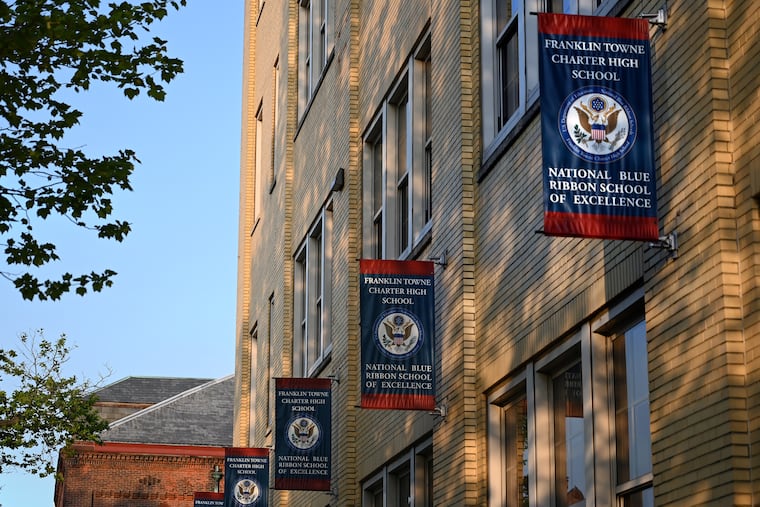Philly schools have taken the rare step of appealing a ruling on Franklin Towne to the Pa. Supreme Court. Here’s what it means.
The Philadelphia School District said a Common Pleas Court judge has overstepped her authority on the Franklin Towne matter.

A Common Pleas Court judge this week ruled the Philadelphia School District is still prohibited from proceeding with revocation hearings for Franklin Towne Charter High School, saying she was satisfied that the school is no longer manipulating its admissions lottery.
But the district has taken a highly unusual step, asking the Pennsylvania Supreme Court to step in because it believes the judge is circumventing state law — effectively ruling on whether Franklin Towne ought to have its charter revoked herself, rather than leaving that matter to the school board and state Charter School Appeal Board, as the law says.
Here’s what the legal wranglings mean:
The Franklin Towne backstory
Officials at Franklin Towne Charter High School in the Northeast, a top academic performer, allegedly fixed the admissions lottery to keep out students from certain zip codes and siblings of pupils with academic and behavioral issues, a violation of state law. The official whom a whistleblower says was responsible for the lottery manipulation has since left the school.
The current Franklin Towne administration says it has changed the way it admits students, moving to a centralized lottery system, but Philadelphia school board officials, acting as the charter authorizer, have said publicly that revocation is the only tool they have under the law to compel Franklin Towne to account for the alleged lottery manipulation and to make certain no further improprieties are occurring. Closing the school, while a possibility of any revocation hearing, is not necessarily the outcome, the board officials said.
The involvement of the court
Philadelphia Common Pleas Court Judge Anne Marie Coyle got involved after Franklin Towne filed a lawsuit to halt the revocation hearing days before the proceedings were supposed to begin. The school objected to the district’s use of Rudy Garcia as its hearing officer.
Garcia was flagged in an independent report examining bias in charter authorizations. That report found that the district engaged in no overt bias, but it recommended the district stop using Garcia for most charter hearings “as this practice has created the appearance of an improper bias toward the Board of Education and has resulted in a lack of trust in the system from the charter school sector.”
After nearly a year, Coyle, who previously sat on another charter school’s board, ruled in late August, prohibiting the district from using Garcia or Allison Petersen, another hearing officer named in the independent report, in any Franklin Towne proceeding.
Coyle, after a hearing on Monday, ordered “that all proceedings related to the non-renewal or revocation of the operating charter of Franklin Towne that had been initiated by the school board are hereby stayed” until appeals are over.
A Supreme Court appeal
The district has appealed Coyle’s August ruling to Commonwealth Court. But earlier this month, it took the rare and extraordinary step of asking the Pennsylvania Supreme Court to intervene. Coyle, the district said, has acted beyond her legal authority.
District lawyers asked for the state high court to exercise King’s Bench authority — or extraordinary jurisdiction — which Pennsylvania law permits it to do in rare matters of immediate public importance.
“The Court should instruct the common pleas court to vacate its orders and immediately dismiss this case for lack of jurisdiction,” district lawyers wrote. “In doing so, this court will allow the Board of Education of the School District of Philadelphia to finally move forward with Franklin Towne Charter High School’s revocation proceedings that the board initiated almost a year ago and that it is required by charter school law to carry out. More broadly, the Court will reinforce for lower courts that jurisdictional boundaries are not to be breached whenever a litigant seeks to avoid legislatively prescribed procedures and a court chooses to address issues exclusively within another tribunal’s purview.”
Franklin Towne lawyers, answering the King’s Bench request, said the district turned to the Supreme Court “without any apparent principled reason.” The district’s concerns with Coyle’s ruling are best aired in Commonwealth Court, the lawyers said.
As for the district’s argument that Coyle’s actions are tantamount to “a rogue trial court that will irrevocably upend charter school proceedings by providing an exemplar to other charter schools who seek to avoid charter revocation proceedings,” Franklin Towne rejected it out of hand.
“Hyperbole aside, these generic arguments are nowhere near the threshold required for this Court to exercise its ‘very high and transcendent’ King’s Bench authority or its sparingly used extraordinary jurisdiction,” Franklin Towne lawyers said.